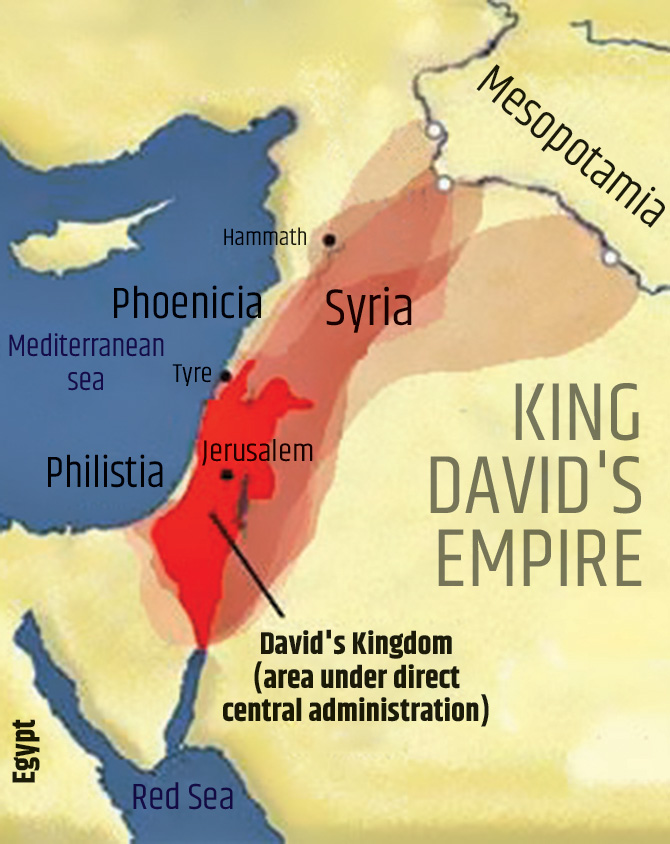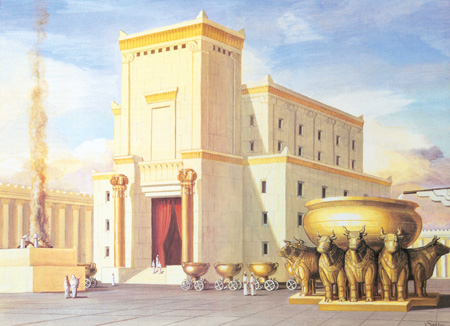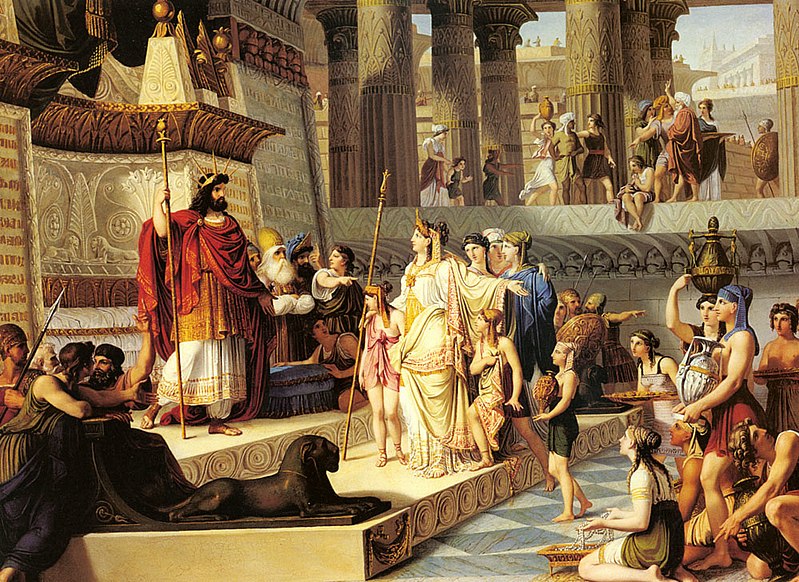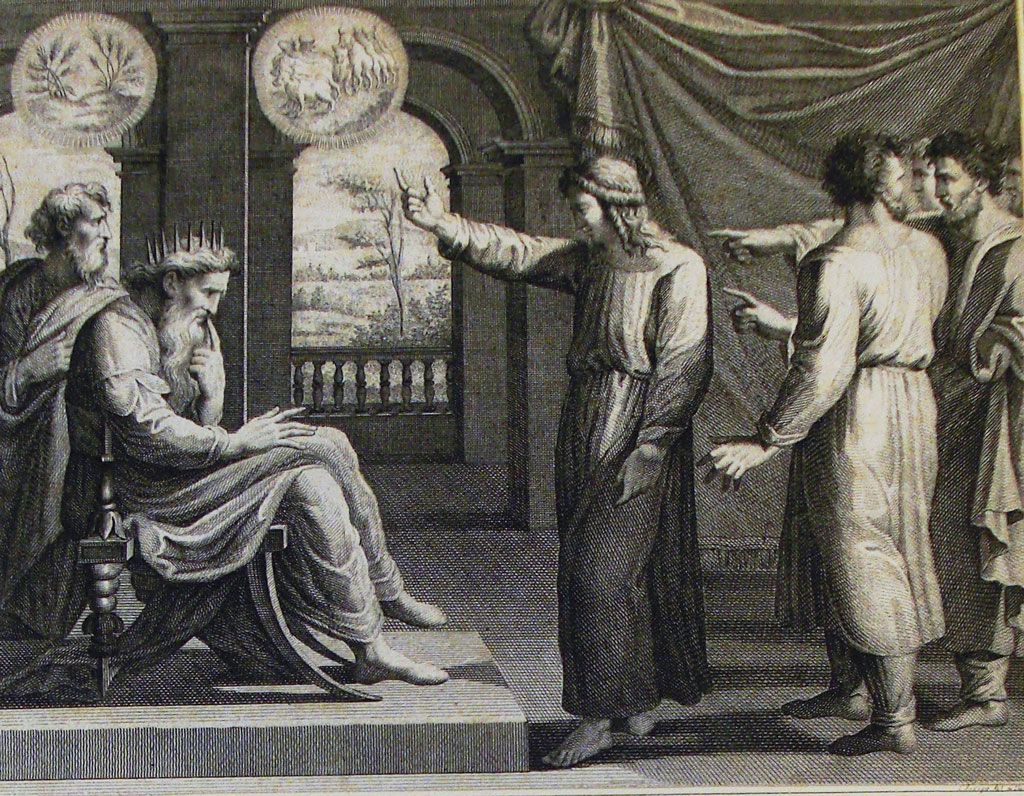
After the Israelites captured Jerusalem, David ceremoniously moved the ‘Tabernacle’ and the ‘Ark of the Covenant’ to the city. Though David was not permitted to undertake the construction of the ‘Holy Temple’, he gradually set about collecting material viz. gold, silver, copper, precious items, rocks and stones of various types that would be required to build it.
Though the period was relatively calm and saw no wars, David was certain that till the time Israel was surrounded by its enemies, the prevalent peace was but an illusion. As a result, time and again he undertook campaigns against the Edomites, Moabites, Ammonites, Amalekites and also against the irarch-enemies – thePhilistines. David defeated them all and also kept the Philistine capital of ‘Gath’ under his control. He then also won the Moabite capital of Rabbah (a city in modern-day Syria).
The state of Zobah (a region in modern-day Syria), which was a major and an important neighbouring state too came under David’s command. During those days, Zobah extended from the city of Damascus right up to the Euphrates River. The Kingdom of Israel was thus, slowly but surely spreading its limbs. David kept gaining control of one region after another belonging to the land that God had promised to the Israelites –thePromised Land that stretched from the ‘River of Egypt’ to the Euphrates. It also included the regions from the modern-day countries of Syria, Jordan and Lebanon. In fact, it was under the rule of David that most of the areas of the ‘Promised Land’ ever came under the Israelite control.

The Israelites were now steadily settling down as a society. Their trade too prospered and the fame of Jerusalem was spreading in the neighbouring regions. Jerusalem’s glory reached Hiram I, the king of Tyre that neighboured Canaan. Hiram signed an agreement of friendship with David. For the construction of David’s palace, he also sent extremely expensive wood of the cedar trees known for their excellent durability. Later during the reign of Solomon, Hiram was to play an important role in the construction of the ‘Holy Temple’ as well.
It was after forty years of ruling Israel that David passed away. Famous as a brave and fearless warrior, David won several battles in his lifetime and earned himself a name. But most of all, he was revered for his unshakable faith in God and his patience. Not that he never committed mistakes or sins, but the point is, he sincerely accepted them, confessed them before God and apologizing to Him, sought divine mercy. This was the reason why his punishments were alleviated and King David became an ideal for the Jews even after his death.
It was God’s wish that Solomon succeed David as the king of Israel, so says the story quite clearly. But some of the other sons of David harboured a secret wish to ascend the throne. They had even started to act on the sly to realize their dream. This had led David to announce Solomon as future king and he had also begun Solomon’seducation and training in politics, administration and Torah. Though David’s decision had met with opposition, both covert and overt from some of Solomon’s step brothers, David had overcome the irrebellion and made Solomon the king. Solomon was twelve years old then.
Within a few days David passed away. The mourning period over, Solomon pleaded to God for prudence and wisdom to enable him to establish the reign of law. God happily consented to the demand and blessed Solomon saying that if he religiously followed the Torah, he and his lineage would not ever be in want.
Solomon’s reign took a relatively peaceful course. The kings who were neutral towards the Israelites as well as the enemies of the Israelites, who were earlier defeated by David wished to maintain friendly relations and hence gifted Solomon with horses and other animals of best breeds, high-grade weapons, gold, silver, precious items, expensive wood and high-quality construction stones and rocks, etc. Israel was prospering as an important trade centre connecting the continent of Asia with that of Africa.
Four years after taking over as king, Solomon began the construction of the ‘Holy Temple’ – the highest religious place of the Jews. Mount Moriah was the place where hundreds of years back, Abraham, the patriarch of the Israelites had express readiness to sacrifice his son Isaac for the word of God. Mount Moriah was the place selected for the construction of the temple.
Thousands of labourers worked day and night for seven years to complete construction of the temple. Along with the things that David had collected for it, the gifts sent as tokens of friendship by the kings of the neighbouring kingdoms too were used in the construction. Within just a year Solomon accumulated thousands of kilograms of gold through such gifts. Moreover, Hiram I made friends with Solomon, the son of his late friend David and thus continued his friendship with Israel. He too helped Solomon in the construction of the temple right from the start. Besides, on Solomon’s request Hiram also sent an expert artisan to him; coincidentally his name too was ‘Hiram’.
Seven years after the construction of the temple, Solomon in a ceremonious procession, moved the ‘Ark of the Covenant’ that was established elsewhere in Jerusalem to the temple at the hands of the priests.

Israelites from all across the land of Canaan had assembled in Jerusalem to witness the historic ceremony. It was about 475 years since the Israelites were set free from the clutches of the Egyptian slavery and the establishment of the Tabernacle as a makeshift place of God in the desert that the Tabernacle became part of the permanent ‘Holy Temple’. King Solomon’s name is firmly associated with the construction of the highest temple of the Israelites.
The glory of the temple and the fame of King Solomon’s wisdom spread far and wide across countries. Not only commoners but also kings came to witness this beautiful edifice, the evidence of Solomon’s wisdom. A story well-known in this regard is that of the ‘Queen of Sheba’. Some scholars refer to her as the queen of some kingdom in the southern part of Arabia while others debate that she was the queen of some kingdom in Africa. She had come to meet Solomon along with camels that were loaded with extremely precious gifts. She posed several difficult questions and riddles but Solomon easily answered and solved them all. Highly impressed with the exceptional intelligence of Solomon, she happily gifted him the precious items that she had brought with her and returned to her kingdom.

Solomon ruled for about forty years. In the twilight years of his life, he committed many mistakes, at times even violated the Torah. Though God made him realize these mistakes, He did not directly punish Solomon as per His promise to David. Instead, God told Solomon that ‘witnessing the nation fall apart is what will come to your son’s lot’. Towards the end of Solomon’s life, one of his army officers named ‘Jeroboam’ led a mutiny against him. Solomon successfully crushed it and Jeroboam fled to Egypt. Solomon, who, all his life, had led Israel to progress, was compelled to experience such setbacks and that too at the end of his life.
Solomon was succeeded by his son, ‘Rehoboam’ to the throne of Israel but….(To be continued…)












